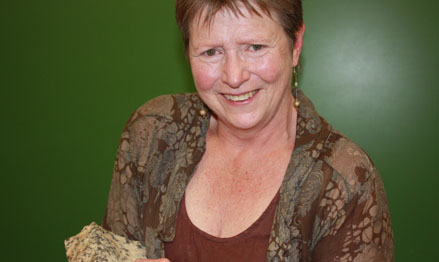Latest News Archive
Please select Category, Year, and then Month to display items
16 February 2024
|
Story ANTHONY MTHEMBU
|
Photo ROSINA MOTHIBA
 Prof Matseliso Mokhele-Makgalwa: Vice Dean; Research, Engagement and Internationalisation in the Faculty of Education at the University of the Free State (UFS).
Prof Matseliso Mokhele-Makgalwa: Vice Dean; Research, Engagement and Internationalisation in the Faculty of Education at the University of the Free State (UFS).
The Faculty of Education at the University of the Free State (UFS) proudly announces the appointment of Prof Matseliso Mokhele-Makgalwa as Vice Dean of Research, Engagement and Internationalisation, effective 1 January 2024. With a wealth of experience and a fervent dedication to academic advancement, Prof Mokhele-Makgalwa’s appointment marks a significant stride towards enhancing the faculty’s global presence and academic prowess.
Transitioning into a new role
Transitioning seamlessly from her previous role as Acting Vice Dean of Research and Postgraduate Studies, Prof Mokhele-Makgalwa perceives this new appointment as a natural progression, elevating her responsibilities to spearhead research endeavours, foster engagement, and cultivate international partnerships within the faculty. Embracing this pivotal role with enthusiasm, she underscores the importance of collaborative efforts among faculty members, securing research funding, and ensuring the quality and impact of scholarly outputs.
“I appreciate the opportunity to contribute significantly to the faculty’s research, engagement and internalisation efforts,” says Prof Mokhele-Makgalwa. “I look forward to collaborating with the faculty staff members to advance our academic initiatives on a broader scale.”
A vision of progression for the faculty
At the heart of her vision lies a commitment to realise the UFS’s Vision130, wherein Prof Mokhele-Makgalwa aims to elevate the international profile of the faculty, foster impactful research, promote engaged scholarship, and facilitate knowledge exchange on a global scale. Her strategic objectives also include positioning the faculty among the top three education schools nationally, reflecting her dedication to academic excellence and institutional advancement.
Prof Tredoux turns theories regarding the formation of metals on its head
2013-09-17
|
 |
|
Prof Marian Tredoux
17 September 2013 |
The latest research conducted by Prof Marian Tredoux of the Department of Geology, in collaboration with her research assistant Bianca Kennedy and their colleagues in Germany, placed established theories regarding how minerals of the platinum-group of elements are formed, under close scrutiny.
The article on this research of which Prof Tredoux is a co-author – ‘Noble metal nanoclusters and nanoparticles precede mineral formation in magmatic sulphide melts’ – was published in Nature Communications on 6 September 2013. It is an online journal for research of the highest quality in the fields of biological, physical and chemical sciences.
This study found that atoms of platinum and arsenic create nanoclusters, long before the mineral sperrylite can crystallise. Thus, the platinum does not occur as a primary sulphur compound. The research was conducted at the Steinmann Institute of the University of Bonn, Germany, as well as here in Bloemfontein.
Monetary support from Inkaba yeAfrica – a German-South African multidisciplinary and intercultural Earth Science collaborative of the National Research Foundation (NRF) – made this research possible. Studies are now also being conducted on other metals in the precious metal group, specifically palladium, rhodium and ruthenium.
The discovery of the nanoclusters and the combination with arsenic can have far-reaching consequences for the platinum mine industry, if it can be utilised to recover a greater amount of platinum ore and therefore less wastage ending up in mine dumps. This will signify optimal mining of a scarce and valuable metal, one of South Africa’s most important export products.
For Prof Tredoux, the research results also prove thoughts she already had some twenty years ago around the forming of platinum minerals. “Researchers laughed in my face, but the evidence had to wait for the development of technology to prove it.” Young researchers were very excited at recent congresses about the findings, since the new models can bring new insights.
“Chemistry researchers have been talking about platinum element clusters in watery environments for quite a while, but it was thought that these would not appear in magmas (molten rock) due to the high temperatures (>1 000 degrees celsius).”
Prof Tredoux has already delivered lectures at congresses in Scotland, Hungary, Sweden and Italy on this research.
Read the article at: http://www.nature.com/ncomms/2013/130906/ncomms3405/full/ncomms3405.html